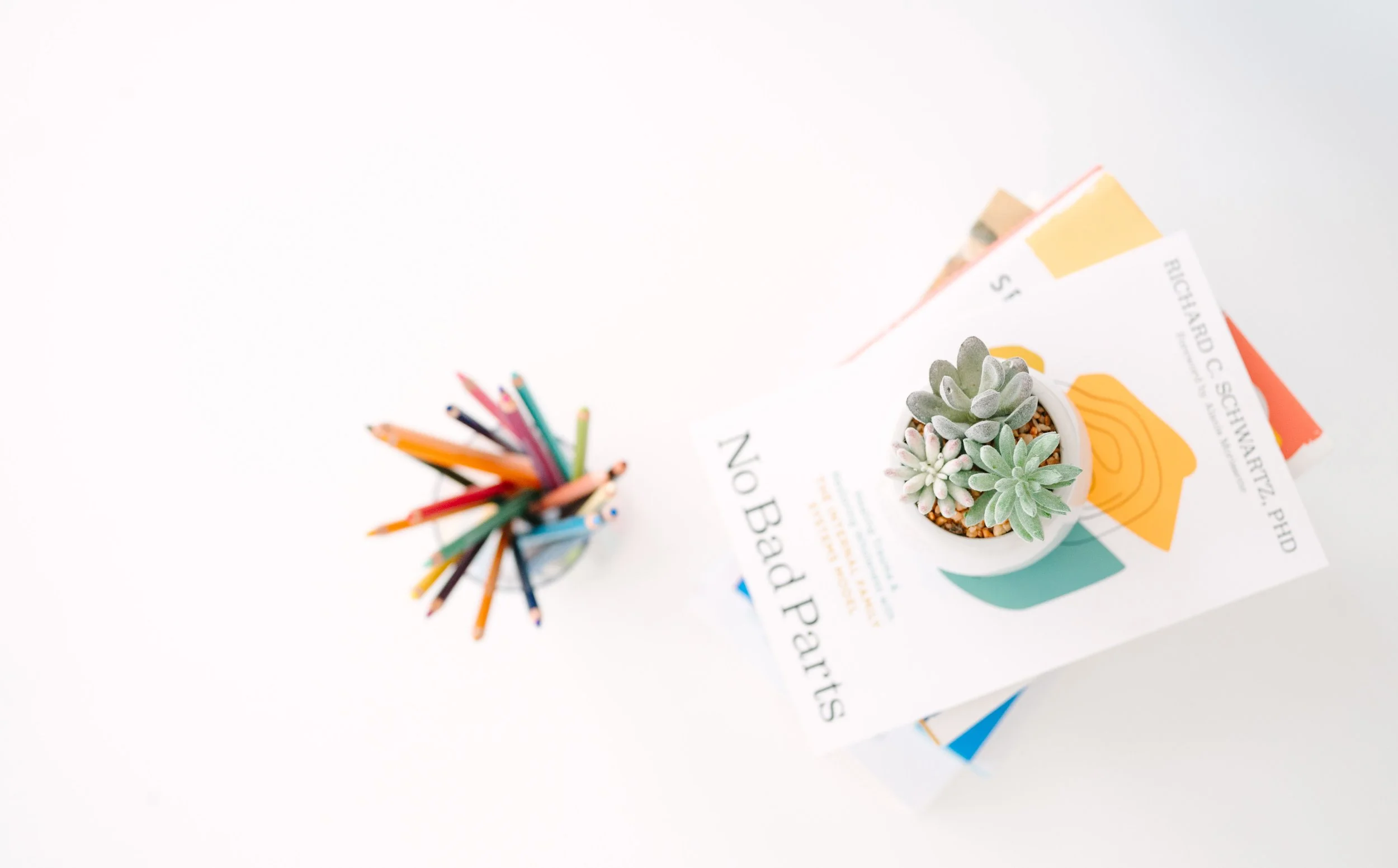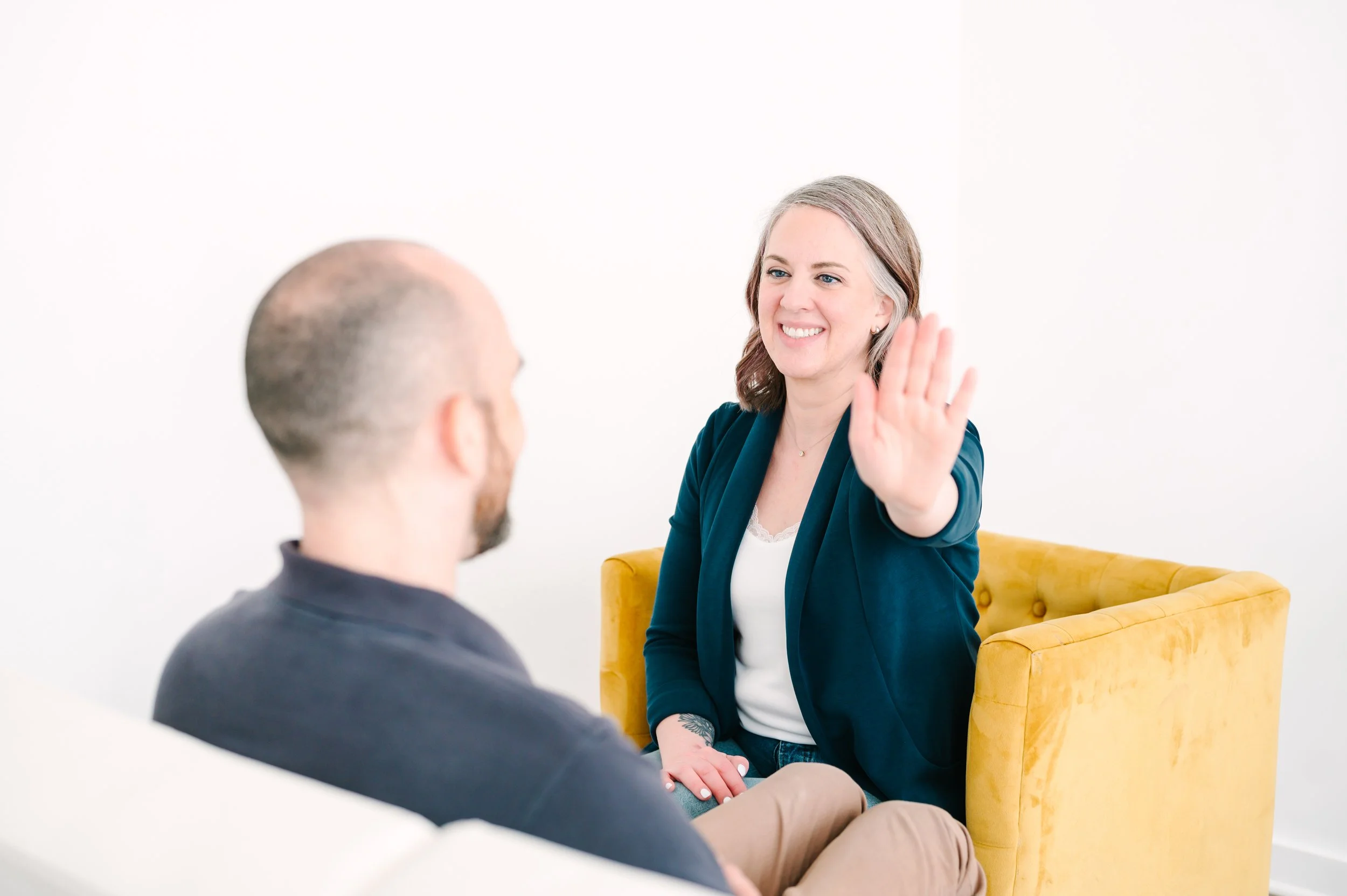EMDR + Accelerated Resolution Therapy
in holly springs, Nc + Online Across IL & NC
ART and EMDR Therapy for Anxiety, Trauma, and Emotional Healing
These evidence-based therapies work with your brain’s natural healing process to help you feel calmer, lighter, and more in control, often in less time than traditional talk therapy.
How ART and EMDR Work
Accelerated Resolution Therapy (ART) and Eye Movement Desensitization and Reprocessing (EMDR) help your brain reprocess distressing experiences in a safe, controlled way.
Instead of talking through every detail, these methods use gentle eye movements or imagery to help your mind and body release the emotional charge of painful memories.
This process helps your brain “update the story” — keeping the facts of what happened, but releasing the feelings that have kept you stuck in cycles of anxiety, shame, fear, or self-doubt. Many clients describe it as finally being able to think about something that used to feel overwhelming and realizing it no longer has power over them.
You stay in control the entire time, and you don’t have to relive past experiences for the therapy to work. ART and EMDR help you create new emotional connections in the brain, so what once felt painful or paralyzing can finally feel peaceful and resolved.
What ART and EMDR Can Help With
These therapies are powerful tools for healing a wide range of experiences, from past trauma to everyday stress and anxiety. You don’t have to have a “big” trauma for these methods to make a difference. If you’re feeling stuck, overwhelmed, or weighed down by your past, ART and EMDR can help you find relief and move forward with clarity and confidence.
ART and EMDR can help you with:
Ongoing anxiety, stress, or overthinking that won’t quiet down
Past trauma or painful memories that still feel heavy
People-pleasing, perfectionism, or self-doubt that keep you stuck
Feeling disconnected from yourself or constantly “on edge”
Low self-esteem or difficulty trusting yourself and others
Burnout and emotional exhaustion
Grief, loss, or major life transitions
Relationship patterns that feel one-sided or unfulfilling
A sense that you’re always “managing,” but never really at peace
These approaches help you get to the root of what’s keeping you stuck, so you can stop re-living the past, start feeling lighter in the present, and finally feel free to move forward.
What Makes ART and EMDR Unique?
ART (Accelerated Resolution Therapy)
Gentle and client-centered – you stay in control while I guide the process with care.
Uses guided imagery, eye movements, and metaphors to help your brain reprocess distressing experiences.
Focuses on changing the images and sensations linked to traumatic memories, reducing their emotional intensity.
Condensed and effective – many clients feel significant relief in just 1–5 sessions.
Less need to retell painful details – making it especially helpful if you want deep healing without going through every part of your story.
EMDR (Eye Movement Desensitization & Reprocessing)
Targets core beliefs connected to past trauma and difficult life events
Therapist takes a supportive, hands-off approach—your brain leads the healing process
A Longer, multi-phase protocol designed to gradually process and integrate memories
Effective for long-term healing, helping reduce emotional intensity and replace old beliefs with healthier ones
I combine the best of ART and EMDR so you can heal more efficiently, feel lighter, and reconnect with your authentic self.
What to Expect in an ART or EMDR Session
It’s normal to feel a little nervous before trying something new, especially when it comes to therapy. My goal is to make sure you feel safe, supported, and fully informed every step of the way.
In our first session, we’ll take time to talk about what you’d like to focus on and make sure you understand how the process works. You’ll stay in control the entire time — nothing happens without your consent.
During an ART or EMDR session, we’ll use gentle eye movements and imagery to help your brain reprocess memories, emotions, or sensations connected to the issue you’re working on. You don’t have to relive the details for it to work, your brain does the healing naturally.
You might notice emotional or physical sensations shifting as we work, like a feeling of lightness, calm, or clarity. Most clients leave sessions feeling grounded and more at peace. Over time, what once felt overwhelming begins to feel more manageable, and you can move forward without the same emotional weight.
Whether we meet in online sessions or as part of a therapy intensive, this work happens at your pace and with full respect for your comfort, boundaries, and needs.
How We Can Use ART & EMDR
-
ART and EMDR can be used alongside your current therapist.
You can keep the supportive relationship you already have while using ART/EMDR as a focused tool to process trauma, anxiety, or specific stuck points.
Many clients find adjunct therapy helps them move past barriers they haven’t been able to address in regular sessions.
-
Longer sessions (90-minutes or more) give us the space to go deeper without feeling rushed.
Ideal for processing complex issues or multiple memories in one sitting.
Allows for thorough grounding and integration, so you leave feeling settled and supported.
-
A powerful, retreat-style format—half-day, full-day, or multiple days.
Creates a concentrated space for profound healing in a shorter time frame.
Perfect if you’re seeking accelerated results, traveling for therapy, or want to focus on a specific issue without the stop-and-start of weekly sessions.
Learn more about intensives HERE.
FAQs About ART & EMDR
-
The session begins with discussing the issue you'd like to address, such as a traumatic memory, anxiety, or emotional distress. You don’t need to go into great detail about the event unless you want to.
Together we will identify specific goals for the session, such as reducing emotional distress, neutralizing a distressing memory, or changing negative thought patterns.
You’ll be encouraged to visualize the distressing memory or emotion while engaging in rapid eye movements (or other forms of bilateral stimulation). I will guide you in reimagining the memory or experience, replacing negative images with positive or neutral ones to reduce emotional triggers.
The session allows you to process and resolve the emotions associated with the memory or issue in a safe, supportive environment. I will ensure you remain calm and grounded throughout the process.
At the end of the session, I will check in with you to assess your progress and emotional state. Many clients feel a significant reduction in distress after just one session.
-
You may experience reduced emotional intensity around distressing memories.
A sense of clarity and new perspectives on past experiences.
Possible physical sensations like fatigue or lightness as you adjust.
Gradual improvements in emotional responses and daily life.
The need for rest and self-care to support the healing process.
We will work together to integreate these new insights and perspectives into your daily life.
If needed, follow-up sessions can address additional memories or refine the progress made.
-
Most clients feel some relief after 1 session. The amount of sessions needed will vary from person to person with most clients seeing results in 1-5 sessions.
-
Emotions and sensations may come up during processing, your therapist will help guide you through strong emotions to continue with processing. Once they are processed, you should feel some relief.
-
No, you are always fully present and in control.
-
Yes, both ART and EMDR are considered safe when conducted by a trained professional. They are non-invasive and designed to reduce emotional distress in a controlled and supportive environment.

You don’t have to keep carrying the same weight or replaying the same patterns.
With ART and EMDR, healing can happen faster and with more ease than you might expect. These approaches can help you feel calmer, more present, and more connected to who you truly are.
If you’re ready to explore whether this approach is right for you, let’s connect. We’ll take time to talk through your goals, answer your questions, and find a plan that fits your needs..







